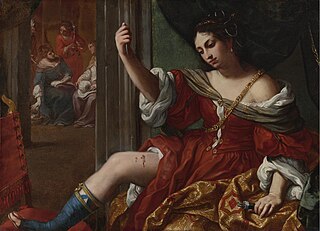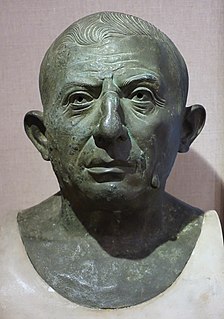
Gaius Julius Caesar was a Roman general and statesman. A member of the First Triumvirate, Caesar led the Roman armies in the Gallic Wars before defeating Pompey in a civil war and governing the Roman Republic as a dictator from 49 BC until his assassination in 44 BC. He played a critical role in the events that led to the demise of the Roman Republic and the rise of the Roman Empire.

The First Triumvirate (60–53 BC) was an informal alliance among three prominent politicians in the late Roman Republic: Gaius Julius Caesar, Gnaeus Pompeius Magnus and Marcus Licinius Crassus.

Gaius Cassius Longinus, often referred to as simply Cassius, was a Roman senator and general best known as a leading instigator of the plot to assassinate Julius Caesar on March 15, 44 BC. He was the brother-in-law of Brutus, another leader of the conspiracy. He commanded troops with Brutus during the Battle of Philippi against the combined forces of Mark Antony and Octavian, Caesar's former supporters, and committed suicide after being defeated by Mark Antony.
Servilia was a Roman matron from a distinguished family, the Servilii Caepiones. She was the daughter of Quintus Servilius Caepio and Livia, thus the half-sister of Cato the Younger. She married Marcus Junius Brutus, they had a son, the Brutus who would assassinate Caesar. After her first husband's death in 77, she married Decimus Junius Silanus, and with him had a son and three daughters.
Aulus Hirtius was consul of the Roman Republic in 43 BC and a writer on military subjects. He was killed during his consulship in battle against Mark Antony at the Battle of Mutina.
Decimus Junius Brutus Albinus was a Roman general and politician of the late republican period and one of the leading instigators of Julius Caesar's assassination. He had previously been an important supporter of Caesar in the Gallic Wars and in the civil war against Pompey. Decimus Brutus is often confused with his distant cousin and fellow conspirator, Marcus Junius Brutus.

Porcia, occasionally spelled "Portia", especially in 18th-century English literature, was a Roman woman who lived in the 1st century BC. She was the daughter of Marcus Porcius Cato Uticensis and his first wife Atilia. She is best known for being the second wife of Marcus Junius Brutus, the most famous of Julius Caesar's assassins.
Marcus Calpurnius Bibulus was a politician of the Roman Republic. He was a plodding conservative and upholder of the established social order who served in several magisterial positions alongside Julius Caesar and conceived a lifelong enmity towards him. In 59 BC he was consul alongside Julius Caesar. Their partnership was contentious to the extent that Caesar arranged for Bibulus to be doused in feces in Rome's main forum on the eve of an important vote. Bibulus withdrew from public politics for the rest of his term.
Titus Pomponius Atticus was a Roman editor, banker, and patron of letters, best known for his correspondence and close friendship with prominent Roman statesman Marcus Tullius Cicero. Atticus was from a wealthy Roman family of the equestrian class and from the Pomponia gens.

Julia was the daughter of Roman dictator Julius Caesar by his first or second wife Cornelia, and his only child from his marriages. Julia became the fourth wife of Pompey the Great and was renowned for her beauty and virtue.
Lucius Gellius Poplicola or Publicola was a Roman senator who led a checkered political career during the civil wars of the late Republic. Initially a supporter of Julius Caesar's assassins, Brutus and Cassius, he defected to the Second Triumvirate and was later rewarded with a consulship, in 36 BC. Gellius fought for Mark Antony against Octavian at the Battle of Actium in 31 BC, after which he disappears from history.
Lucius Domitius Ahenobarbus, consul in 54 BC, was an enemy of Julius Caesar and a strong supporter of the aristocratic (Optimates) party in the late Roman Republic.

Quintus Caecilius Metellus Pius Scipio, often referred to as Metellus Scipio, was a Roman senator and military commander. During the civil war between Julius Caesar and the senatorial faction led by Pompey, he was a staunch supporter of the latter. He led troops against Caesar's forces, mainly in the battles of Pharsalus and Thapsus, where he was defeated. He later committed suicide. Ronald Syme called him "the last Scipio of any consequence in Roman history."

The writings of Marcus Tullius Cicero constitute one of the most renowned collections of historical and philosophical work in all of classical antiquity. Cicero was a Roman politician, lawyer, orator, political theorist, philosopher, and constitutionalist who lived during the years of 106–43 BC. He held the positions of Roman senator and Roman consul (chief-magistrate) and played a critical role in the transformation of the Roman Republic into the Roman Empire. He was extant during the rule of prominent Roman politicians, such as those of Julius Caesar, Pompey, and Marc Antony. Cicero is widely considered one of Rome's greatest orators and prose stylists.
Marcus Favonius was a Roman politician during the period of the fall of the Roman Republic. He is noted for his imitation of Cato the Younger, his espousal of the Cynic philosophy, and for his appearance as the Poet in William Shakespeare's play Julius Caesar.
Gaius Calvisius Sabinus was a consul of the Roman Republic in 39 BC under the Second Triumvirate. He and his consular colleague Lucius Marcius Censorinus had been the only two senators who tried to defend Julius Caesar when his assassins struck on 15 March 44 BC, and their consulship under the triumvirate is taken as a recognition of their loyalty. An inscription, described by Ronald Syme as "one of the most remarkable inscriptions ever set up in honour of a Roman senator," praises Calvisius for pietas, his sense of duty or devotion. As a military officer, Calvisius is notable for his long service and competence, though he was not without serious defeats.

The gens Axia, also spelled Axsia, was a plebeian family at Rome during the final century of the Republic and the beginning of the Empire. The gens does not appear to have been particularly large or important, although at least some of the family were reasonably wealthy.

The gens Caecilia was a plebeian family at ancient Rome. Members of this gens are mentioned in history as early as the fifth century BC, but the first of the Caecilii who obtained the consulship was Lucius Caecilius Metellus Denter, in 284 BC. The Caecilii Metelli were one of the most powerful families of the late Republic, from the decades before the First Punic War down to the time of Augustus.
The military campaigns of Julius Caesar constituted both the Gallic War and Caesar's civil war. The Gallic War mainly took place in what is now France. In 55 and 54 BC, he invaded Britain, although he made little headway. The Gallic War ended with complete Roman victory at the Battle of Alesia. This was followed by the civil war, during which time Caesar chased his rivals to Greece, decisively defeating them there. He then went to Egypt, where he defeated the Egyptian pharaoh and put Cleopatra on the throne. He then finished off his Roman opponents in Africa and Hispania. Once his campaigns were over, he served as Roman dictator until his assassination on March 15, 44 BC. These wars were critically important in the transition of the Roman Republic into the Roman Empire.
Publius Licinius Crassus Dives was a Roman senator during the time of the First Triumvirate in the late Republic. He was the judge who examined in 59 BC the controversial affair of Lucius Vettius, who was supposedly involved in a conspiracy to assassinate the "triumvir" Pompey. Broughton supposed, on basis of this, that Dives had been a plebeian aedile in the previous year. Dives was a praetor in 57 BC, and, along with his other colleagues in office, supported the recall of the ex-consul Cicero from exile. He appears to have squandered a substantial amount of his wealth, causing Cicero to comment, in 59 BC, that his surname Dives was no longer appropriate for him. Valerius Maximus reported that Crassus went bankrupt and that the name "Dives" became a provocative taunt; this must have happened after his term as praetor.
 Smith, William (1870). "Caesar 13". In Smith, William (ed.). Dictionary of Greek and Roman Biography and Mythology . 1. p. 538-539.
Smith, William (1870). "Caesar 13". In Smith, William (ed.). Dictionary of Greek and Roman Biography and Mythology . 1. p. 538-539.







